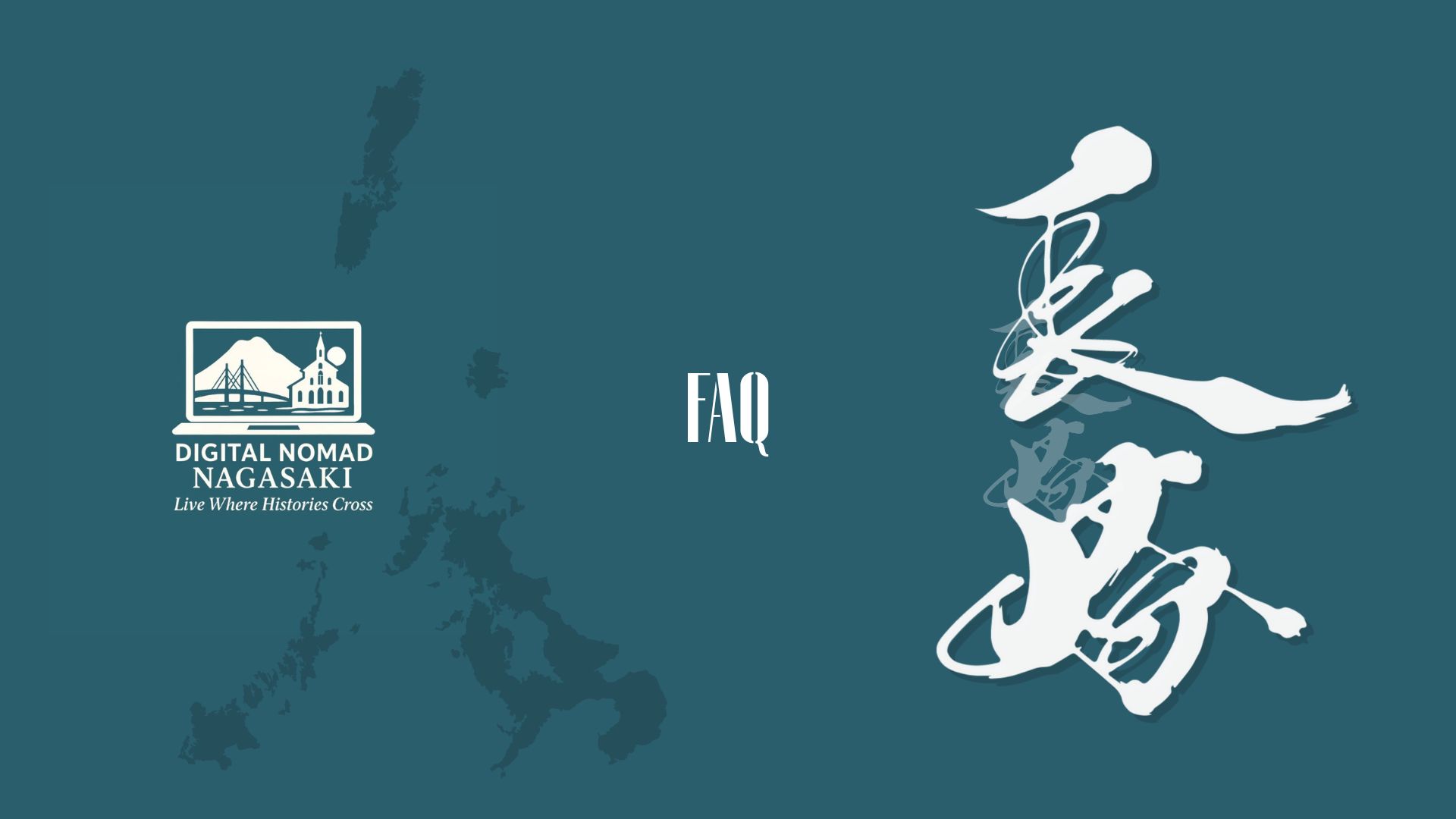FAQ
Last updated:
Digital Nomad Nagasaki — FAQ Summary

Thank you again for your interest to join Digital Nomad Nagasaki!
We have compiled the FAQ below, which brings together the questions raised during the online meetup as well as those received by email. We hope this will be useful as you consider your participation.
Please note that the final application deadline for this year is Friday, August 22. We kindly ask you to review the information and submit your application by then.
1. How will the program create a lasting impact on the local community?
Answer:
The team is working with local partners, schools, and community managers to ensure digital nomads contribute meaningfully beyond short stays. Participants are encouraged to bring ideas (e.g., fishing, art, farming, workshops), and the team will connect them directly with local communities. Flexibility is built in—leaving space for spontaneous exchanges and long-term collaborations.
2. How can non-Japanese speakers connect with locals?
Answer:
Language is a challenge, but not a barrier. Community managers and bilingual locals will help translate. Activities with schools and young people also provide natural opportunities for cross-cultural exchange. “Imperfect” communication is often seen as a way to build deeper relationships.
3. What is expected from participants during the 30-day stay?
Answer:
Beyond co-living and co-working, participants are expected to share expertise, create content, host workshops, or contribute ideas that benefit Nagasaki. Initially, the vision was promotion through content creators, but now all contributions—education, business advice, cultural workshops—are welcomed. At a minimum, sharing your experience with your own network is valuable.
4. Will there be opportunities for cooking and cultural exchange through food?
Answer:
Yes. Weekly community gatherings on Tuesday evenings can include shared cooking sessions (kitchens will be available). The program also plans cooking exchanges with locals. Nagasaki has a rich seafood culture and participants will experience unique local dishes beyond tuna.
5. Are workshops and skill-sharing part of the program?
Answer:
Yes. Dedicated spaces will be arranged for participants to lead workshops on topics such as YouTube, marketing, or other skills. The goal is collaborative knowledge exchange between nomads and the local community.
6. Is there an arts community in Nagasaki?
Answer:
Yes. Nagasaki has respected museums and a developing art scene. While international access is still limited, organizers will help connect artists with local institutions and communities. Visiting exhibitions is also encouraged.
7. Will there be a permanent co-living space in Nagasaki?
Answer:
Not yet. While a co-living space previously existed, the current program relies on monthly apartments and local real estate partners. However, the team is open to developing a more permanent base if demand continues.
8. Are there opportunities for casual exchanges, like sports or games with locals?
Answer:
Yes. Sports, games, and cultural activities with locals are encouraged. For those interested, visits to Tsushima Island (famous as the setting of the “Ghost of Tsushima” video game) are also being considered.
9. Are there opportunities related to farming, agriculture, or permaculture?
Answer:
Yes. In the Unzen area, young farmers are building communities focused on sustainable farming and permaculture. Participants interested in farm-to-table content or agriculture will be introduced to these initiatives.
10. Is blogging or multilingual content useful for promotion?
Answer:
Absolutely. Blogs and written content are as valuable as photos and videos. Content in any language (English, Spanish, French, Chinese, etc.) is welcome, since it helps attract diverse participants globally.
11. Can participants update their contribution ideas after submitting the application form?
Answer:
Yes. If you already submitted the form but have new ideas, you can email the team directly or use an alternative form to update your application.
12. Will there be opportunities to collaborate with NGOs or charitable organizations?
Answer:
Yes. Particularly in peace-related initiatives, Nagasaki has youth and nonprofit groups that need global support. For example, students often collect signatures to bring to the UN. Participants can contribute ideas and energy to amplify these initiatives.
13. Are there opportunities to engage with local schools and students?
Answer:
Yes. There are connections with passionate teachers and schools. Participants can inspire and collaborate with students who are learning about entrepreneurship, revitalization, and global perspectives.
14. Are applicants with families allowed?
Answer:
Yes, families are welcome. However, accommodations may require special arrangements (e.g., booking two rooms or staying in a separate hotel), since the prepared rooms are small (semi-double or bunk bed style). Extra coordination will be necessary.
15. Are there similar digital nomad programs in Nagasaki or elsewhere in Japan?
Answer:
Yes, several regional retreats are emerging across Japan. For updates, check the Japan Digital Nomad Association (JDNA) on Instagram or Discord, which regularly shares program information:
👉 JDNA Instagram Example Post
As for 2026, no confirmed programs yet. However, the organizer also runs a coliving project in the Goto Islands, offering a peaceful, nature-focused experience:
👉 The Pier Goto Instagram
16. Are there 24/7 coworking spaces available?
Answer:
Unfortunately, no coworking spaces in Nagasaki currently operate 24/7, nor do they have fully enclosed private rooms. The local style is relaxed—meetings can often be held anywhere. For sensitive calls, participants may need to use their accommodation. (Some even jokingly use karaoke rooms for meetings—work first, shout then, stress out!🎙️)
17. Are Tuesday Community Gatherings mandatory?
Answer:
Not strictly, but strongly encouraged. These gatherings are designed to build community and take place in beautiful venues. While schedules vary, attending will make the experience more rewarding.
18. What are the visa requirements?
Answer:
Visa rules depend on nationality, so always check with your local Japanese embassy/consulate. In general, based on guidance from the Japan Tourism Agency, remote work for overseas clients can be done on a tourist visa. Many participants have joined past programs this way.
A digital nomad visa also exists, but uptake is still limited: it takes around 3 weeks to process and has restrictions. Please plan carefully if considering this option.
Arigato!